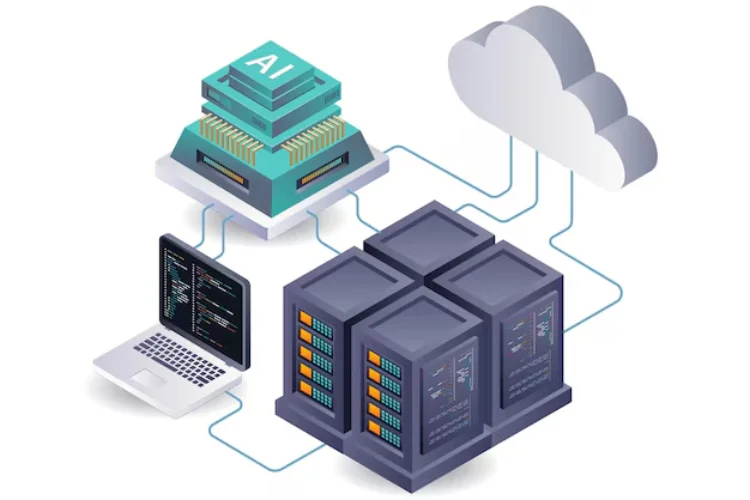How Much Does a Cloud Server Cost for a Small Business?
Are you, like most small businesses, searching for optimal ways to save money? You’re not alone. Whether it’s considering cloud servers for scalable storage or robust cloud hosting, small businesses often struggle with the decision to invest in servers for major or minor tasks. The cost of a server is usually a significant concern for companies running small business servers.

With effective and competitive pricing models, managing cloud costs has become less of a challenge. This article will help you understand the key differences between traditional physical servers and cloud servers, along with the costs associated with cloud servers. Let’s dive in and explore the topic further.
Why Small Businesses Should Consider a Cloud-Based Server
Table of Contents
A cloud-based server is more a centralized server run by a cloud computing service provider. Cloud servers are upon request. You are only billed for the assets you choose to utilize for business operations. Take it as an ideal approach to saving money because the cost fluctuates with the requirement list.
Do you know the development price of cloud services has dropped drastically over the years? If you are new to this, the surprise is obvious. The cost should keep falling as technology advances. The price comprises hardware, installation, management, and repair.
Do you think every business needs a server? You are misjudging here. There are several small businesses flawlessly operating in the market without giving a damn thought to having their server. But if your business needs a server, you can simply have it. There are some pressing reasons why small business servers make sense:
- Growth is fundamental and once it begins to happen, meaning you have dozens of computer devices to handle, dealing with the Cloud becomes hard. One pivotal device for server handling would be a smart solution.
- Your staff requires access to email and company-owned data storage solutions.
- Data accessibility should be robust and non-stop at all times, something the Cloud can’t promise.
- Using the router/Wi-Fi modem by an ISP for your network security doesn’t guarantee your business security, putting it at an unwanted risk.
- In the troublesome data scenario, you are at a loss for backup solutions.
If you are the one thinking any of the points above make sense for you, then choosing a perfect cloud server for a small business is worth it.
Physical Server vs Virtual Server
A physical server is a hardware unit comprises of;
- CPU
- RAM
- Storage
- Network Interfaces
It is best for clients seeking for;
- Higher storage capacity
- Performance from OS
- Well performed databases
- Scientific simulations
Physical servers are also preferred to reduce potential risks as they offer the best security features if the client opts for security-sensitive applications.
On the other side;
A virtual server is a completely software-based server. It acts as a physical computer simulation. Whereas a physical server has hardware for its OS. A virtual cloud server functions in an intricate system. It allows multiple VMs to operate simultaneously under virtual computing resources. It also includes sharing of all the data and network resources among all VMs.
- Virtual servers ensure hardware efficiency
- Scale virtual servers up or down as the demands change
- Virtualization reduces overall cost and energy consumption
A virtual server is a glossy option for clients looking for higher productivity without expanding their footprint. These servers are preferable for;
- Web applications
- Web hosting
- Development phase
- Testing environment
Which Server Option is Best? | Renting vs Buying
Deciding on two is a mind-boggling task. Similar is the case when it is about choosing whether your small business should go for rent or buy a server. If you are comparing the rent of a remote server for accounting in the cloud with the total purchase of the server, don’t fret. The spongy response is, it depends on the business needs and the options currently available. Whether you need an eco server hosting or a secure server infrastructure, nothing is unachievable. The third option that anyone could rarely be aware of is colocation. Surprised? Some brief details about renting, buying or collocating a server are jotted down below.
Renting
- Single fixed cost per month (for security, power, cooling, hardware, and professional support)
- Server issues support at any time
- The best and latest hardware is provided for you
- Budget-friendly hardware cost
- Flexible maintenance and repairing
Keeping the facts straight, it can be a pricey option for long-term goals. Direct physical access is not available for data storage on your server, and lack of ownership is among the gray areas of renting a server.
Buying
- A single solid and upfront payment to buy all the hardware
- Customized server to get what you need
- Using the same hardware saves most budget
- Direct physical access to hard drives
- Data storage offline as it is not a cloud-based server
Some dark spots include heavy financial costs in case of hardware breakage, no extra layer of server data safety, the need for IT experts for installation and maintenance, and networking, cooling, and power expenses that will be entirely on your shoulders.
Colocation
- Effective monitoring and storage of your business server 24/7
- All-time remote access to your small business
- It’s not a cloud server
Moreover, it includes upfront hardware costs for one or more servers purchased. Hosting cost per month is also included for a dedicated server. Businesses are responsible for any hardware replacements in case of hardware damage.
To explore colocation vs cloud, it is all about how the important data is managed and stored. The private cloud server is owned by the cloud service provider and managed virtually, whereas, in colocation, servers are not the property of the facility. They are owned by the business, leasing the space.
What are Best Cloud Based Solutions?
If you want to know why cloud adoption is the best choice for small businesses, this section covers all the ideal cloud-based resources. They can be easily accessed, scaled, and managed to meet business demands. Some of the key solutions are listed below.
Platform-as-a-Service (PaaS)
It provides a unified environment for market-friendly application creation, working, and management. The infrastructural intricacies are well managed with it. With its vast tools, libraries, and options, application development for small businesses is easier.
Infrastructure-as-a-Service (IaaS)
IaaS is an incredible remote access solution to extract computing groundwork. It includes data storage setup, virtual servers, and network connectivity. This helps small businesses easily scale up or down.
Function-as-a-Service (FaaS)
This is a form of serverless computing where clients can effortlessly develop and run apps without managing servers. It is a budget-friendly option with extra resources for vital business operations.
Software-as-a-Service (SaaS)
SaaS is the best cloud-based option enabling small businesses to easily access and utilize software apps. It requires an internet connection on a recurring payment basis. Organizations can smoothly access multiple apps such as email, CRM software, and different collaboration tools.
What is Cloud Server Pricing for Small Businesses?
Pricing is ideally based on the business needs and demands. There are various misconceptions about fixed pricing, but let’s put it to rest finally. The cloud computing cost is primarily based on several key factors;
- Resources and services utilized
- Cloud service model
- Choice of cloud service provider
- Timeframe of cloud infrastructure usage
When it comes to pricing, clients have options for cloud services on pay-as-you-go pricing (billing based on actual resource usage) or choose a subscription (reserved instances where discounts are given based on fixed-term commitments) to scale the available resources according to the business needs. These solutions make cloud cost management rather easier. For the exact price information, figure out the key requirements of your business and analyze different pricing structures offered by cloud service providers.
You can experience the best small business server solutions with a cyber security in cloud built-in feature to keep all the operations secure and seamless. The pay-as-you-go pricing model defines the pricing structure for only the resources you use. Let’s explore the popular cloud servers.
Microsoft Azure
Azure is a professional cloud computing server for building, quality assurance, deploying and managing apps and services. These all activities are performed through data centers. Experience a tested pricing calculator to manage the budget for cloud hosting. Azure offers both PaaS and IaaS platforms.
Google Cloud Platform
It is an excellent cloud computing service with a high-performance index. It offers potential computing power, content delivery, DB storage, and other functional options to better scale and grow small businesses.
AWS
As a professional cloud platform, AWS offers database storage capacity, high computing power, flawless content delivery, and other functionalities. It is one of the most popular cloud providers in the world.
How to Calculate Cloud Computing Cost
The cloud-related usage patterns define the pricing models. With the following handy tips, it is easier to calculate cloud computing expenses.
- Manifest your workloads
- Lean on cloud cost calculators
- Analyze pricing models
- Track resource usage
- Make a budget and Forecast
This is how you can easily calculate your business cloud server expenses and take effective measures to timely reduce the costs.
Want to Know the Best Cloud Migration Strategies? Go for a Pro
If you have decided to introduce your business to digital innovation and next-level efficiency, nothing can stop you. Choosing the expertise of advanced IT cloud servers is a one-stop solution for small businesses. From build, and deployment to management, professionals can make it a breeze for you. Let’s fill out the contact form and book a discussion session on how to migrate to cloud technology profitably.
FAQ
What is the Average Cost to Rent a Cloud Server Per Month?
The average minimum cost is $100-$300 per month. However, the price variation depends on the business needs, data storage requirement and cloud service provider.
Can I Run a Server from Home?
Yes, you can surely run a centralized server from home with the right hardware to manage all files, and stream media. You can easily access your home network from anywhere in the world.
Which Cloud Server is Best?
Among various top cloud server platforms, AWS and Azure show fierce competition. Choosing the one as the best out of both, AWS comes on the top with 33% total global market share.
Why Use Cloud Instead of Server?
Migration from server to cloud takes away the worries of power outages, space considerations, and costly hardware or software. Your business can easily focus on revenue generation and customer relationships, not IT.




